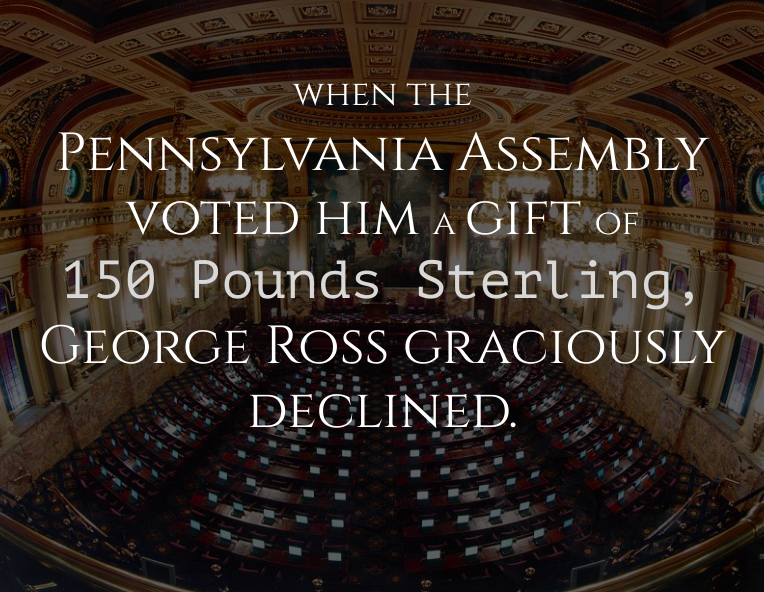Mark Cole
The essential elements of the life of George Ross of Pennsylvania are by now very familiar to us, as his story is like so many in the founding era. Without men like George Ross, our country as we know it would never have existed.
Therefore, it is vital that we resist the temptation to become ambivalent to the details of the lives of the men who gave birth to American freedom. Rather, we do well to step back and ponder how a single era can have so many exceptional human beings in it. A feeling of awe is altogether appropriate.
What exactly happened prior to 1776 which produced such a formidable array of men such as George Ross, who was, in every way, so characteristic of the founding fathers?
The complete answer to that question could fill many volumes, yet, this much is clear: a benevolent and sovereign God providentially governs history and when He desires to bless a people with freedom and liberty, He will raise up a generation of men who will win that freedom and give birth to liberty. That liberty will last for precisely as long as the people who benefit from it remain good stewards.
And the men that God raises up to give birth to freedom always seem to look a lot like George Ross.
George Ross grew up in Delaware, where he was educated by his father, an Episcopal clergyman. After becoming proficient in Greek and Latin, he read law in the Philadelphia law office of his brother. When he was all of 21 years old, he entered the bar and was married that same year.
For the next 17 years, Ross built his legal practice and became aligned with the independence movement. He established a reputation as an honest, diligent and ethical lawyer. Accordingly, he was elected to the Pennsylvania Assembly in 1768 and the Continental Congress in 1774, serving in both bodies simultaneously.
Like the other 55 signers of the Declaration of Independence, in the summer of 1776, Ross publicly defied the Crown, asserted the independence of the colonies and never looked back. Sadly, Ross did not live to see independence obtained, but died in poor health at the age of 50, in 1780, shortly after being appointed an admiralty judge for Pennsylvania.
Throughout his political and legal career, George Ross’ integrity was beyond question. He was not wealthy. He believed that serving in a legislative body was a public trust and that one should serve without compensation. So, when the Pennsylvania Assembly voted him a gift of one hundred fifty pounds sterling, George Ross graciously declined.
Ross also had a special burden of insuring that Native Americans with whom the colonists came into contact were treated fairly and justly. He was often appointed as the chief mediator when difficulties arose between the colonials and the Native Americans and on many occasions he was successful in averting hostilities.
Though Ross was as zealous as any of the other signers of the Declaration in his desire for independence, he was also was known to counsel against lawlessness and private vengeance against Tories in Pennsylvania who were loyal to the Crown and who actively fought against the Continental Army. At all times, Ross was reasonable and steadfast, and he was never overtaken with fanaticism.
His contributions to independence were many. But George Ross alone was not indispensable. You see, independence would have been won without the singular contributions of George Ross as an individual.
But, independence would not have been won without the type of man that George Ross was: classically educated by his father, grounded in history, trained in the law, deeply religious, fearless in duty, zealous when necessary, yet restrained and reasonable at all times.
It is those characteristics which separate the American cause of independence from other revolutionary movements. Without the contributions of scores of men like George Ross, our story would be entirely different.
And perhaps – just perhaps – if we are prayerful and obedient in our lifetime, the same benevolent and sovereign God will raise up a new generation of men like George Ross to once again secure the blessings of liberty to ourselves and our posterity.
Check out Mark’s book:
Lives, Fortunes, Sacred Honor: The Men Who Signed the Declaration of Independence













